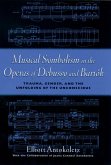This is the first book-length examination of Bart?k's 1911 opera
Duke Bluebeard's Castle, one of the twentieth century's enduring operatic works. Writing in an engaging style, Leafstedt adopts an interdisciplinary approach to the opera by introducing, in addition to music-dramatic analysis, a number of topics that are new to the field of Bart?k studies. These new areas of critical and scholarly terrain include a detailed literary study of the libretto and a gender-focused analysis of the opera's female character, Judith. Leafstedt begins with a short introductory chapter that places
Duke Bluebeard's Castle within the context of Bart?k's early composing career, his discovery of folk music, and its impact on his later work. The book goes on to explore the composition's troubled history, its failure to win two early Hungarian opera competitions, and the three versions of the ending that resulted, discussed here in depth for the first time. The core of the book is devoted to the musical and dramatic organization of the opera and offers an analysis of the seven individual door scenes, including a detailed analysis of scene six, the "lake of tears" scene, illustrating the work's complex tonal organization and dramatic structure. A separate chapter places this darkly psychological version of the Bluebeard story within the broader context of European history and literature. Throughout the book, Leafstedt draws on original Hungarian source material, much of it newly translated by the author and available here for the first time in English, and he includes a generous selection of musical examples.
Inside Bluebeard's Castle is an ideal starting point for research in twentieth-century music, Hungarian cultural history, and opera studies, as well as an invaluable guide for anyone interested in Bart?k's only opera.
Dieser Download kann aus rechtlichen Gründen nur mit Rechnungsadresse in A, B, BG, CY, CZ, D, DK, EW, E, FIN, F, GR, HR, H, IRL, I, LT, L, LR, M, NL, PL, P, R, S, SLO, SK ausgeliefert werden.









